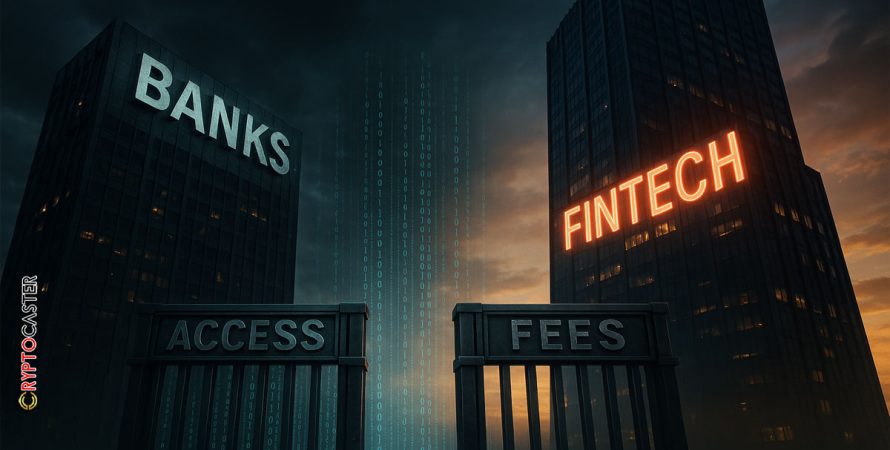JPMorgan’s proposed API charges ignite a high-stakes battle between financial giants and the innovators who rely on their data.
By CryptoCaster Editorial Desk
The battle lines are drawn. In a move that has rattled the fintech and cryptocurrency sectors, several major U.S. banks—led by JPMorgan Chase—are preparing to introduce data access fees for third parties that connect to bank systems to retrieve customer financial information.
Stay in the know on crypto by frequently visiting Crypto News Today
Until now, this access—whether through secure APIs or through data aggregators—has largely been free, forming the backbone of open banking innovation. That could change as early as September 2025, when JPMorgan is expected to roll out its first wave of charges.
What Are Data Access Fees?
In the context of banking, data access fees are charges that a financial institution imposes on third parties—like budgeting apps, payment services, crypto exchanges, and lending platforms—for retrieving customer-authorized financial data.
This data is essential for services ranging from real-time account balances to automated investing, and for crypto platforms, it often enables faster fiat-to-digital asset conversion and compliance verification.
The proposed fees would not be for transferring money or executing trades; rather, they would be for the privilege of accessing the raw data itself—effectively placing a tollbooth on the information highway.
CryptoCaster Quick Check:
The Banks’ Rationale
JPMorgan and other large banks argue that maintaining secure data infrastructure comes at a significant cost. With JPMorgan’s 2025 technology budget exceeding $18 billion, executives say fintechs are “free-riding” on investments that banks alone are shouldering.
Jamie Dimon, JPMorgan’s CEO, has likened the current arrangement to “leaving the front door unlocked and letting strangers use your electricity and internet for free.” The fees, banks say, would help recover costs, improve security, and potentially limit the number of low-value or duplicative data requests.
Fintech and Crypto’s Counterattack
The response from fintech and crypto leaders has been swift and coordinated. Over 80 CEOs—including leaders from Klarna, Robinhood, Kraken, Gemini, PayPal, Stripe, and the Winklevoss twins—signed a letter to President Trump urging him to block the proposed fees.
Their arguments center on three points:
- Innovation at Risk – They warn that access fees will act as a gatekeeper tax, stifling small startups that depend on cost-free data to compete.
- Consumer Rights – Many see bank customers’ data as belonging to them, not the banks, and say consumers should have free, direct access to their financial information.
- Market Competition – If only the largest players can afford the fees, the fintech and crypto landscapes could consolidate, reducing consumer choice and pushing prices higher.
Katherine Porter, CEO of a leading DeFi wallet platform, put it bluntly:
“We’re on the verge of turning open banking into closed banking, just with shinier locks.”
The Regulatory Wild Card
The Consumer Financial Protection Bureau’s (CFPB) 1033 Rule, grounded in the Dodd-Frank Act, was designed to guarantee free access to consumer financial data. But the rule is under legal attack, and a shift in political leadership could weaken enforcement.
If the rule is overturned—or even delayed—it could clear the runway for banks to monetize data access. That prospect is precisely what has the fintech and crypto sectors on edge.
Why This Matters for Crypto
For the crypto industry, this isn’t just about app integrations—it’s about on- and off-ramp efficiency. Exchanges, DeFi platforms, and wallet providers rely on instant, low-cost access to user banking data for identity verification, anti-fraud measures, and rapid settlement of fiat transactions.
If banks start charging for this access, costs could be passed down to crypto users, reducing adoption and throttling the pace of Web3 innovation in the U.S. at a time when other jurisdictions are actively courting blockchain businesses.
The Broader Stakes
This fight is not simply about who pays—it’s about who controls the future of financial data. In one scenario, banks set the tolls and dictate the rules. In another, fintechs and crypto companies retain low-cost access, fostering an environment where competition and innovation thrive.
The tension mirrors earlier battles in telecom and internet history, where infrastructure owners attempted to monetize access, sparking debates over net neutrality and digital rights.
What’s Next
- Legal Battles – Expect lawsuits from industry coalitions challenging the legality of data fees under existing consumer protection laws.
- Lobbying Surge – Both sides will likely intensify their outreach to lawmakers and regulators in the coming months.
- Consumer Impact Campaigns – Fintech and crypto firms may take their case directly to the public, framing the issue as one of personal financial freedom.
Bottom Line: The outcome of this fight could shape the economics of financial innovation for the next decade. Whether data remains an open resource—or becomes a gated asset controlled by the largest banks—will determine how quickly, and by whom, the next generation of fintech and crypto solutions are built.
If this article brought you clarity, insight, or value—support the work that made it possible.
At CryptoCaster, we report on Web3, crypto markets, and institutional finance with no billionaire owners, no shareholders, and no hidden agenda. While mainstream media bends toward Elon Musk, BlackRock, and JPMorgan narratives, we stay focused on what matters: truth, transparency, and the public interest.
We don’t just cover the headlines—we investigate the power structures behind them. From FTX and Ripple to the quiet push for CBDCs, we bring fearless reporting that isn’t filtered by corporate interests.
CryptoCaster is 100% paywall-free. Always has been. To keep it that way, we depend on readers like you.
If you believe independent crypto journalism matters, please contribute—starting at just $1 in Bitcoin or Ether. Wallet addresses are below.
Your support keeps us free, bold, and accountable to no one but you.
Thank you,
Kristin Steinbeck
Editor, CryptoCaster
Support CryptoCaster: The Unfolding of Money
At CryptoCaster.world, we’re dedicated to bold journalism, sharp insights, and fearless commentary across blockchain, Web3, and crypto markets. Your **Bitcoin contributions** help us stay independent and continue delivering signal over noise.
🚨 CryptoCaster does not offer investment advice. Always DYOR—volatility is real, and risk tolerance matters.
Support our mission. Contribute BTC today.
🔗 Bitcoin Address:
3NM7AAdxxaJ7jUhZ2nyfgcheWkrquvCzRm
Thank you for backing our journalistic lens as we chronicle the Unfolding of Money — a saga still being written in real time.![]()
CRYPTOCASTER HEATMAP







